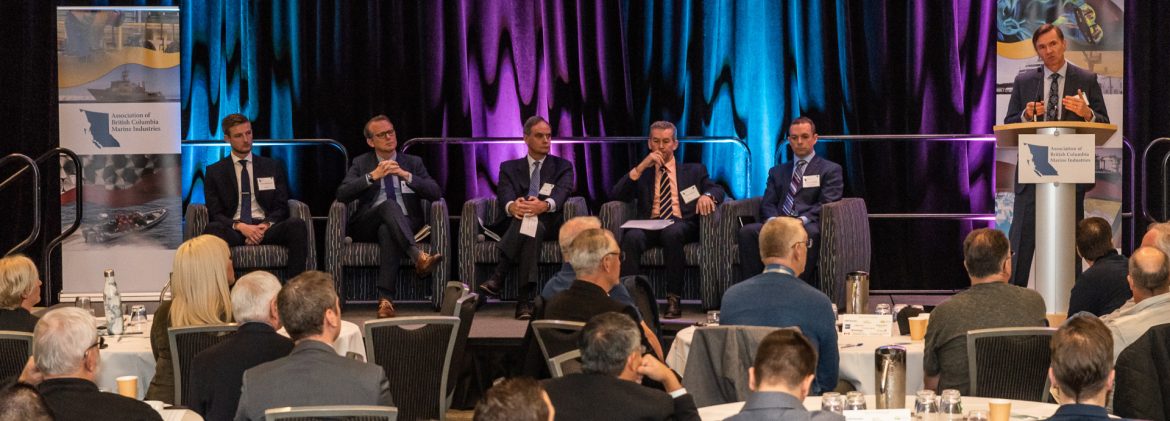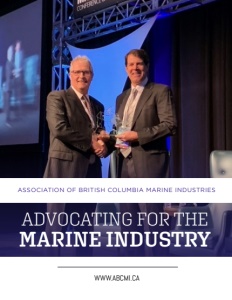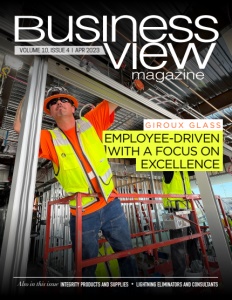Association of British Columbia Marine Industries
advocating for the marine industry
Providing educational, advocacy, and business- related support for marine-focused members, the Association of British Columbia Marine Industries navigates the BC waters
It is quite a feat to discover how many events and initiatives the Association of British Columbia Marine Industries (ABCMI) is involved with considering that it is expertly run by only two full-time employees. In just six years, ABCMI has stamped its imprint on the industrial marine sector in Western Canada.
That sector is responsible for more than 1,100 companies, 22,700 employees, and over $7.2 billion in economic output, says ABCMI Executive Director Alex Rueben. It includes a handful of sub sectors like shipbuilders and ship repair companies, marine products, small craft marine,industrial marine services including marine infrastructure, and ocean science and technology companies.
The association is best known as an expert in organizing and executing industry events. Those events are focused on everything from education and networking to training and recruiting. “We want to be as effective as possible to further industry interests,” says Rueben.
ABCMI membership provides just that – an emphasis on supporting industry-specific needs. Membership confers benefits such as positive influence on public policy, new business opportunities, reduced-cost access to international marketing and trade shows, preferential access to senior policymakers, and visibility into future infrastructure and procurement opportunities.
Members are encouraged to pool their collective sector-wide knowledge on challenging issues which includes consolidation of training demand to reduce delivery costs.
Rueben works to facilitate access to government funding for industry initiatives, developing relationships with federal and provincial departments. One benefit of strengthening these relationships is access to government grants that can further spark post-COVID economic activity. Access to these grants can be difficult to attain otherwise.
Those grants can also help pay for co-op student wages working in the industrial marine sector or supporting innovation design competitions.
“It can be tough to find the funds for some programs in our industry so that can be a big part of what we do,” Rueben says.
Among the main objectives that ABCMI emphasizes with members are workforce, supply chain, and member strategies. More specifically:
ABCMI champions relationships and strategies which permanently enhance the development of stable, satisfying, and desirable careers within British Columbia’s industrial marine sector. Attracting and recruiting new talent into the sector is an ongoing objective given the potential worker shortage the industry will face in the coming years. A sizable percentage of today’s aging workforce will be retiring. As a result, ABCMI’s website has a job board that often includes more than 1, 000 open jobs at any given point.
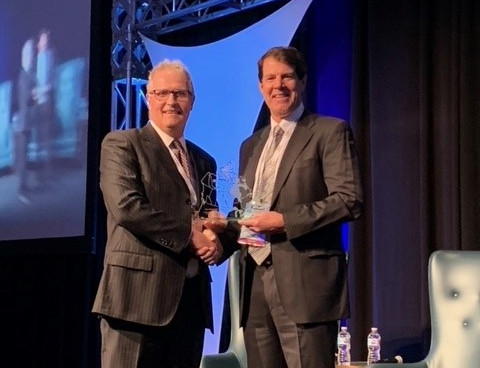
Alex Rueben being presented the ‘Navigator Award’ by the Canadian Government to the Association of British Columbia Marine Industries (ABCMI) for being the organization that has done the most to connect and represent the marine industry with the federal government.
Part of the focus on workforce development is to increase the diversity of professionals working in the industry, including more women, Indigenous People, and persons of color. Recruiting young people to understand the abilities and opportunities of working in the sector continues.
That’s important because Indigenous People used maritime skills as part of their daily lives which have always been an essential component of British Columbia’s history.
Says Rueben, “you have so many paths to choosing an interesting and fulfilling career where you can make a good salary and have great job security.”
Technology specialists are in need of the industrial marine industry as well to keep up with the ever-changing evolution of high-tech machinery and sector tools. The marine industry is reinventing the traditional means of shipbuilding and manufacturing into a seascape of opportunities with advanced technologies forming and shaping a new digitized sector.
Technology is embedded in most systems on ships, and electronic engineers are the type of professional that is needed to help design new systems now and in the future.
ABCMI works with the marine sector in British Columbia in outreach activities to support the labor shortage, Rueben says. For example, it works closely with universities like the University of Victoria to promote careers in the industry, while creating videos for younger school children to watch in their classrooms and learn about the industry in general and what jobs they might want to start thinking about.
The association also supports career events working with the Canadian Coast Guard and the Royal Canadian Navy on recruiting efforts.
“We actively want to connect with candidates about jobs that they may be interested in,” says Rueben, who adds that another target demographic is “new Canadians.” He adds, “we work collectively with organizations like the Canadian Marine Careers Foundation and the Western Marine Community Coalition to connect with groups and employers in the marine industry.”
While a good portion of the ABCMI’s recent efforts has been on industry retention and recruitment, it also creates resources and spreads education about other relevant topics of interest as well. Many of its events are designed to spread knowledge around the industry to its professionals so that they are more informed on resources that can help their businesses scale-up and build market-share for their products and services.
A second objective is sector strategy. Working in partnership with the Government of British Columbia, ABCMI will assist in the refinement and implementation of a sector strategy that enhances the capabilities and reach of the province’s industrial marine sector.
One of many examples is a collaboration between the association and Canada’s Ocean Supercluster. This is an industry-led, national ocean cluster that’s growing the ocean economy in a digital, sustainable, and inclusive way.
The supercluster works with ABCMI and other industry groups to gather startups, scale-ups, as well as mature organizations from coast-to-coast across the fishery, aquaculture, bioresources, offshore resources, marine renewables, ocean technology, and more to foster new partnerships and innovative projects built on collaboration. It is designed to advance Canada’s position as a global leader in ocean technology and commerce.
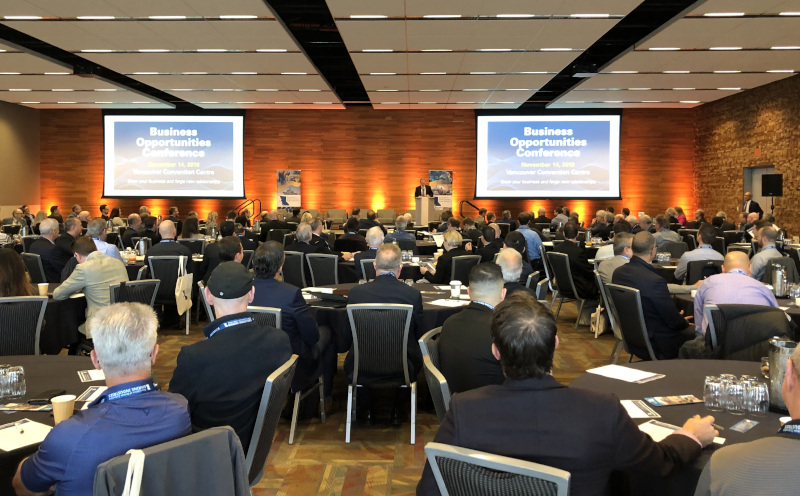
Supply chain development is another objective. ABCMI assists in broadening British Columbia’s marine supply chain, focusing on areas in which the sector can be internationally, nationally, and locally competitive. Fortunately, many association members have not experienced an overwhelmingly negative supply chain impact since the COVID pandemic, but establishing relationships and building new networks remains a goal.
BCMI creates services and benefits expected by members and works to deliver the value that supports members’ continued participation in the Association. ABCMI also works with organizations across Canada that have an interest in furthering the Canadian blue economy.
For example, ABCMI works with Oceans Advance, the Newfoundland and Labrador ocean technology trade group to collaborate on workforce development solutions or advances in ocean technology that bring together the many stakeholders in the Canadian marine sector The goals of that organization are similar to those of ABCMI, and sharing of resources is extremely useful to both parties.
In addition to the aforementioned partners that ABCMI works with are others who bring value-added workforce development and training activities to the industrial marine industry in Western Canada. One is LearnSphere, a company based in New Brunswick specializing in supplier development and supply chain training that Ruben and his team use to provide online learning.
Another is Oceans Network Canada (ONC) an ocean sensing and observing facility hosted and aligned with the University of Victoria, and managed and operated by the ONC Society, a not-for-profit established in 2007. ONC delivers ocean data from its cabled, mobile, and community-based observing networks that represent an essential component of Canada’s ocean observing science capacity.
Furthermore, ABCMI has developed partnerships with the University of British Columbia, Simon Fraser University, the British Columbia Institute of Technology, and Camosun College for vocational and apprenticeship programming, industry-focused training, and post-secondary education. “These and other partners are working to help our companies acquire training and education that they will need for their employees to grow and sustain a highly skilled workforce that meets the needs of today and tomorrow, “ Rueben says.
The attraction and retention of professionals to the industrial marine industry are and will remain a paramount goal for the association. Rueben also wants to further increase his work with the governments – both federal and provincial entities – to support industry growth and opportunities.
Another initiative is to support innovation and industry knowledge and adaptation in the use of new technologies.. This includes looking at ways alternative fuels, artificial intelligence, and Big Data where it can support the industry. There are many ways for employers to become more efficient in their operations using such technologies, Rueben says, and he wants the ABCMI to be a resource that helps them realize the possibilities. “ And we want to help our members stay abreast of advances in the digitalization of the supply chain and how they can prepare for them.”
“We are always looking at ways that global warming impacts the industry and our members,” Rueben says. The reduction of GHG and decarbonization in the marine sector is something that ABCMI is increasingly paying attention to and always featuring in discussion at these events. Regueben adds that autonomous marine vessel operations and increased technological automation are also of increasing relevance to the industry.”
AT A GLANCE
Association of British Columbia Marine Industries
What: the advocacy, educational, and voice for the BC marine sector
Where: Victoria, British Columbia
Website: https://www.abcmi.ca/
